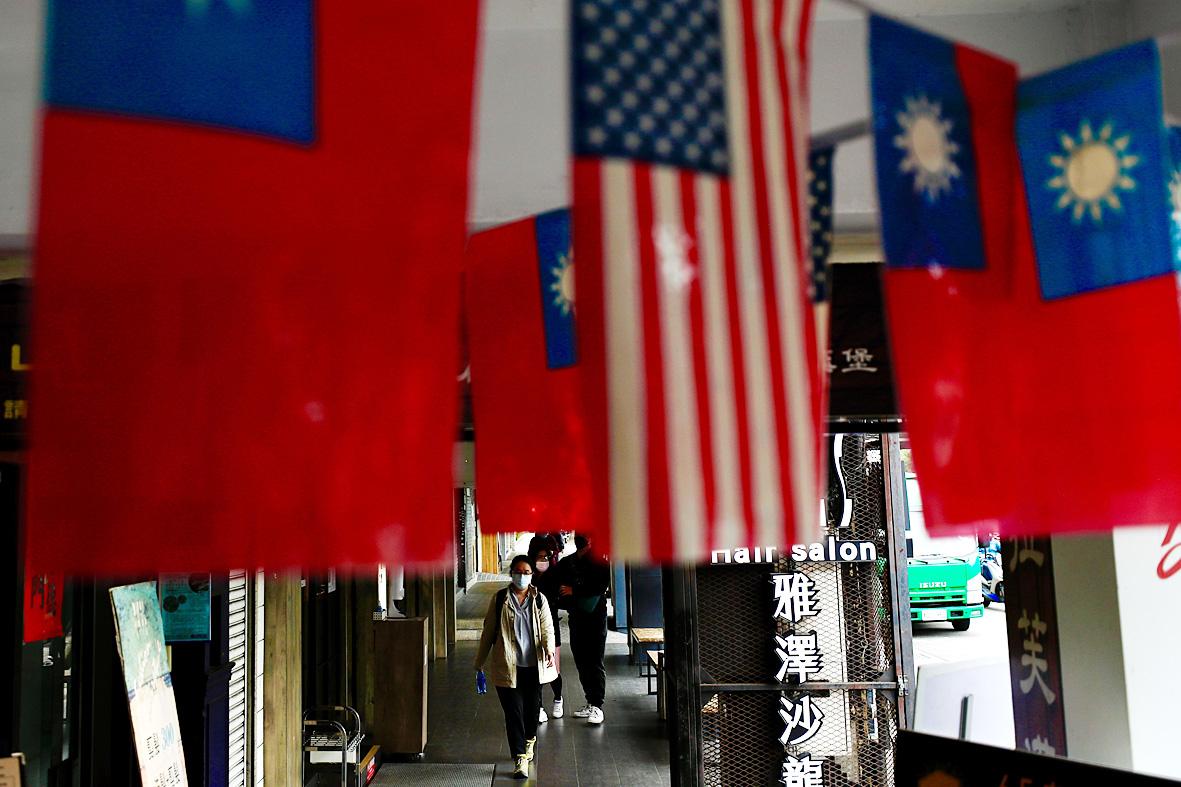The Office of the US Trade Representative (USTR) recognized Taiwan’s efforts to enhance trade secret protections, while citing online piracy as an ongoing concern, in an annual report released on Wednesday.
This year’s “Special 301” report, which monitors intellectual property (IP) protection and enforcement among US trading partners, was the second to be published under US President Joe Biden’s administration by US Trade Representative Katherine Tai (戴琪).
In the report, the USTR identified Taiwan, along with the EU and Chile, as partners that have recently strengthened or are working to strengthen their trade secret regimes.

Photo: Ritchie Bo. Tongo, EPA-EFE
While the report did not cite any specific examples, the legislature has amended a range of intellectual property laws as part of its bid to join the Comprehensive and Progressive Agreement for Trans-Pacific Partnership trade pact.
The US and Taiwan also met under the Trade and Investment Framework Agreement framework in June last year to discuss “developments related to the enforcement of trade secrets protections, copyright legislation and digital piracy,” the report said.
However, the report identified Taiwan as one of 16 markets with “notable” levels of streaming content piracy through illicit streaming devices and illicit Internet protocol television service apps.
In addition to Taiwan, the other markets included China, Hong Kong, Indonesia, Singapore, Canada and Brazil.
China was also named as a manufacturing hub for piracy devices.
The USTR maintained China’s place on a “priority watch list” — along with Argentina, Chile, India, Indonesia, Russia and Venezuela — of countries with major deficiencies in their IP protections.
Although China passed a number of legal reforms last year to strengthen such protections, it has yet to address issues such as weak enforcement channels, and a lack of transparency and judicial independence, the report said.
The USTR also urged China to provide “a level playing field” in the area of IP protections, to refrain from requiring or pressuring technology transfers to Chinese companies, and to open to foreign investment and “embrace open and market-oriented policies.”
Washington will continue to monitor Beijing’s progress in implementing its commitments under the “phase one” trade agreement that the two countries signed in January 2020, the report said.

KEEPING UP: The acquisition of a cleanroom in Taiwan would enable Micron to increase production in a market where demand continues to outpace supply, a Micron official said Micron Technology Inc has signed a letter of intent to buy a fabrication site in Taiwan from Powerchip Semiconductor Manufacturing Corp (力積電) for US$1.8 billion to expand its production of memory chips. Micron would take control of the P5 site in Miaoli County’s Tongluo Township (銅鑼) and plans to ramp up DRAM production in phases after the transaction closes in the second quarter, the company said in a statement on Saturday. The acquisition includes an existing 12 inch fab cleanroom of 27,871m2 and would further position Micron to address growing global demand for memory solutions, the company said. Micron expects the transaction to

Vincent Wei led fellow Singaporean farmers around an empty Malaysian plot, laying out plans for a greenhouse and rows of leafy vegetables. What he pitched was not just space for crops, but a lifeline for growers struggling to make ends meet in a city-state with high prices and little vacant land. The future agriculture hub is part of a joint special economic zone launched last year by the two neighbors, expected to cost US$123 million and produce 10,000 tonnes of fresh produce annually. It is attracting Singaporean farmers with promises of cheaper land, labor and energy just over the border.

US actor Matthew McConaughey has filed recordings of his image and voice with US patent authorities to protect them from unauthorized usage by artificial intelligence (AI) platforms, a representative said earlier this week. Several video clips and audio recordings were registered by the commercial arm of the Just Keep Livin’ Foundation, a non-profit created by the Oscar-winning actor and his wife, Camila, according to the US Patent and Trademark Office database. Many artists are increasingly concerned about the uncontrolled use of their image via generative AI since the rollout of ChatGPT and other AI-powered tools. Several US states have adopted

A proposed billionaires’ tax in California has ignited a political uproar in Silicon Valley, with tech titans threatening to leave the state while California Governor Gavin Newsom of the Democratic Party maneuvers to defeat a levy that he fears would lead to an exodus of wealth. A technology mecca, California has more billionaires than any other US state — a few hundred, by some estimates. About half its personal income tax revenue, a financial backbone in the nearly US$350 billion budget, comes from the top 1 percent of earners. A large healthcare union is attempting to place a proposal before